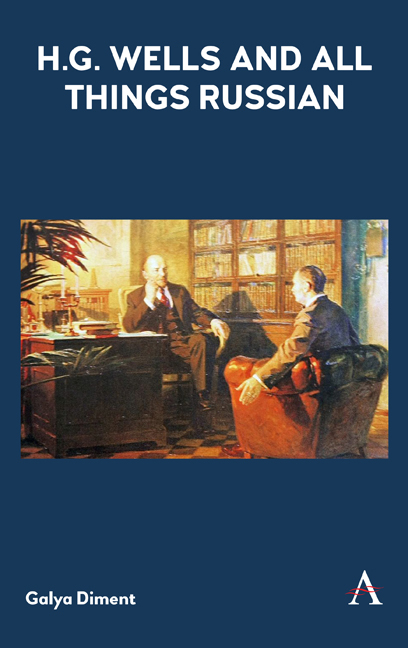Book contents
- Frontmatter
- Dedication
- Contents
- List of Illustrations
- Acknowledgments
- List of Contributors
- A Note on Transliteration
- Introduction: “The Wells Effect”
- Part One WELLS IN RUSSIA: PRE-WORLD WAR II
- Part Two WELLS IN RUSSIA: POST-WORLD WAR II
- Part Three RUSSIA IN WELLS
- APPENDIX TRANSLATIONS
- Bibliography
- Wells, Herbert George – Works Index
- General Index
Introduction: “The Wells Effect”
Published online by Cambridge University Press: 06 September 2019
- Frontmatter
- Dedication
- Contents
- List of Illustrations
- Acknowledgments
- List of Contributors
- A Note on Transliteration
- Introduction: “The Wells Effect”
- Part One WELLS IN RUSSIA: PRE-WORLD WAR II
- Part Two WELLS IN RUSSIA: POST-WORLD WAR II
- Part Three RUSSIA IN WELLS
- APPENDIX TRANSLATIONS
- Bibliography
- Wells, Herbert George – Works Index
- General Index
Summary
So it is I interpret the writing on the Eastern wall of Europe.
— H. G. Wells, Russia in the ShadowsAt the end of Russia in the Shadows, H. G. Wells calls Russia “The Eastern wall of Europe” and suggests that it is vitally important for the fate of “all modern civilization” to try to interpret “the writing” on this particular wall as carefully and accurately as possible. “Wells and All Things Russian” is such fertile terrain for research and discussion that it is rather surprising this book is the first one to devote itself entirely to this theme. There have been other excellent books that touched on some aspects of this topic most notably The Reception of H.G. Wells in Europe (2013), edited by Patrick Parrinder, one of the contributors to this volume, and John S. Partington, as well as chapter III (“H. G. Wells: Interpreting the ‘Writing on the Eastern Wall of Europe’”) in From Orientalism to Cultural Capital: The Myth of Russia in British Literature in the 1920s, by two more of our contributors, Olga Sobolev and Angus Wrenn. Yet, this is indeed the first (and, hopefully, not the last) effort to focus entirely on how Wells and Russia influenced each other. The Russian and Soviet fascination with Wells, facilitated by a very large number of his translations, was, for a long time, one of the most powerful collectively felt for a foreign author. The critical articles in this volume discuss the rich relationships, both personal and literary, between Wells and his contemporary Russian writers, including Maxim Gorky, Evgeny Zamyatin, Alexander Belyaev, Vladimir Nabokov, Mikhail Bulgakov and Sigizmund Krzhizhanovsky. They likewise analyze how Wells's evolving views of Russia and the Soviet Union were reflected in both his fiction and nonfiction, and examine the ways in which Wells was portrayed in Russia and the Soviet Union not just in the press and literary works but also on screen and stage. The Appendix features a compilation of some of the most important Russian, émigré and Soviet archival materials and publications about Wells from the 1910s, 1920s and 1930s— the decades during which he traveled to Russia— as well as post-World War II. All of them appear here in English for the first time.
- Type
- Chapter
- Information
- H. G. Wells and All Things Russian , pp. 1 - 10Publisher: Anthem PressPrint publication year: 2019



